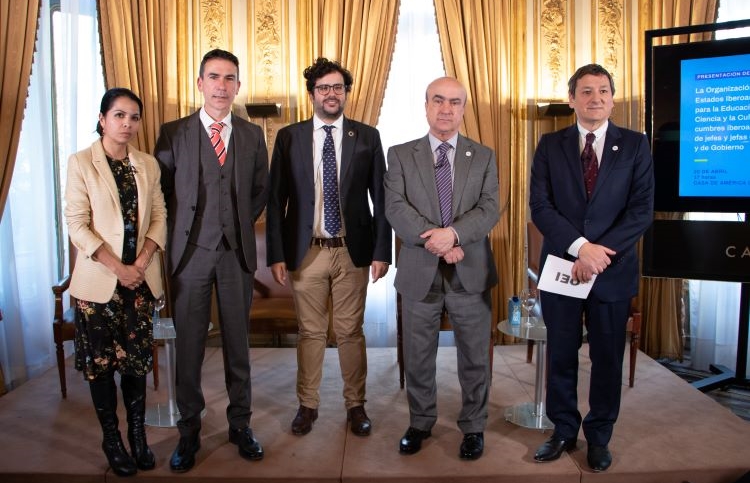The Diplomat
The Casa de América headquarters in Madrid hosted last Wednesday the presentation of a report on the role played to date by the Organization of Ibero-American States for Education, Science and Culture (OEI) in the development of the Ibero-American Summits.
The report, entitled The Organization of Ibero-American States for Education, Science and Culture and the Ibero-American Summits of Heads of State and Government, analyzes the role played by this international organization in the development of these high-level meetings coordinated by the SEGIB, with special mention of the “summit programs” dedicated to education, science and culture in the region. The study was carried out by researcher Érika Rodríguez Pinzón and its presentation was attended by OEI Secretary General, Mariano Jabonero; Casa de América Director, Enrique Ojeda; and the Director of the Spanish Agency for International Development Cooperation (AECID), Antón Leis.
According to Mariano Jabonero, although “the OEI’s activity is not limited to the political and programmatic sphere of the summits”, its areas of work -education, science and culture- “constitute the most stable area of Ibero-American cooperation, which justifies its commitment to the most emblematic programs that have arisen at the summits”. Likewise, Jabonero affirmed that the region has two challenges that must be worked on jointly: “climate change and digital transformation”. For his part, Antón Leis stressed that Spanish cooperation has been and will always be in Latin America because “we have to avoid new crises and avoid a crisis of democracy and institutions”.
According to researcher Érika Rodríguez, the characteristic of Ibero-American cooperation lies in the fact that “the projects start up on their own” because “their appropriation is encouraged beyond institutional life”. The challenge lies, according to Rodríguez, “in being able to measure the impact of the programs”, something in which the OEI has been a pioneer even before the implementation of the 2030 Agenda.
The study analyzes the determining role of education, science and culture, and therefore of the OEI, in the agendas proposed at all the Ibero-American summits, from the first in 1991 in Guadalajara, Mexico, to the last in Andorra la Vella, in 2021. For this reason, the analysis breaks down the twenty emblematic programs approved at these meetings – the “summit programs” – with a special focus on those in which the OEI has had an outstanding level of intervention due to their educational, scientific and cultural nature. It also details the main achievements obtained since their implementation.
Thus, in the field of education, it highlights the lifelong literacy programs, developed together with SEGIB; the program Educational Goals 2021 to the 2030 Agenda, approved at the Mar del Plata Summit in Argentina in 2010, and for which the OEI developed an entire system for evaluating and monitoring these goals and their achievement; the international mobility programs in higher education and science, promoted by the OEI and endorsed by Ibero-American leaders at summits; or the Ibero-American University 2030 strategy, which seeks to advance in the construction of a common space for higher education and research, taking as a bastion the enormous potential of sharing two languages such as Spanish and Portuguese.
On the cultural front, the report highlights the role of the Ibero-American Cultural Charter, the first regional document that, at the political and institutional level, recognizes the value of culture as an indispensable pillar for the social and economic development of Ibero-America. The Charter was adopted at the XVI Ibero-American Summit in Montevideo in 2006 and since then has driven national policies to strengthen this sector in a region that is emerging as a “cultural powerhouse” and where around two million jobs are generated, representing between 2% and 4% of the regional GDP.





